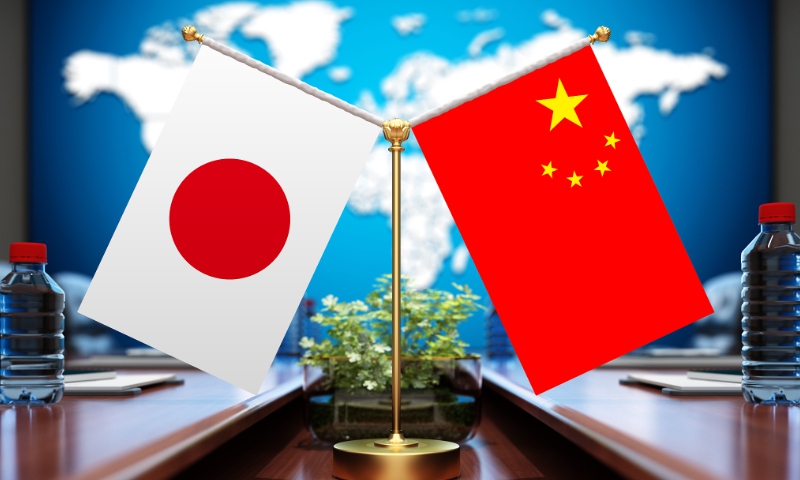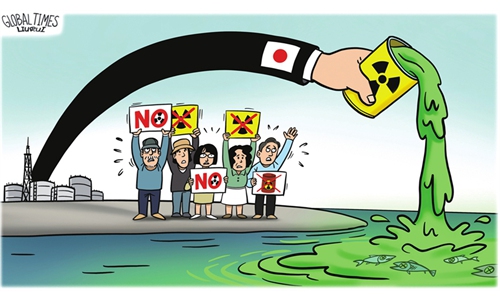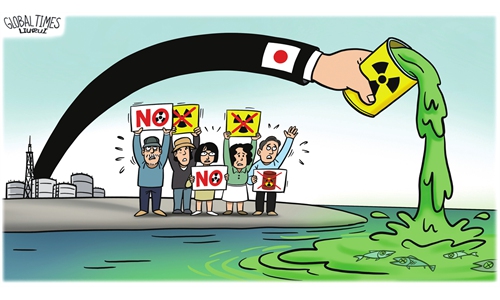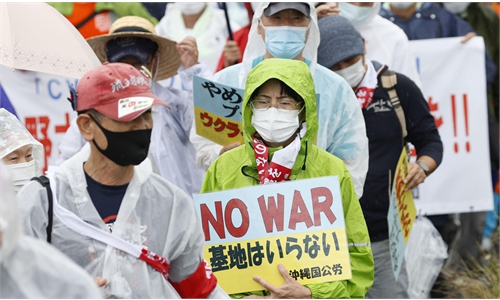Japanese trade association visits China, looking to enhance bilateral economic cooperation, stabilize relationship

China Japan Photo: VCG
The Japan Association for the Promotion of International Trade (JAPIT) President Yohei Kono led a delegation to China for a visit from Monday, the first in four years, with the entourage consisting of more than 80 members including Okinawa Governor Denny Tamaki and representatives of Japanese companies.
Experts noted that the visit represented the Japanese business community's wish to maintain and strengthen economic and trade ties with China, expressing hope that Japan's policy toward China to be in line with the interest of the country and its people.
Chinese Commerce Minister Wang Wentao held talks with Yohei Kono and the Japanese delegation on Tuesday. They had in-depth discussions on China's reform and opening-up policy, bilateral economic and trade relations, cooperation in emerging areas, and the stability of industrial and supply chains.
Wang spoke highly of the contributions made by JAPIT over the years to promote economic and trade cooperation between the two countries. He emphasized that China's door of openness will only open wider. He hoped that the Japanese association would continue to facilitate dialogue and exchanges between China and Japan, and strengthening economic cooperation.
The commerce minister welcomed Japan to expand cooperation with China in green and low-carbon development, healthcare and elderly care and the digital economy, while jointly safeguarding the stability of industrial and supply chains.
According to the Kyodo News, JAPIT is one of the seven Japan-China friendship groups whose activities are aimed at promoting Japan-China friendship and strengthening economic and trade relations. And the ongoing visit is aimed at promoting stable relations between the two countries.
During this trip to China, Tamaki will visit East China's Fujian Province, which has had a sister relationship with Okinawa since 1997. In an interview with the Global Times conducted ahead of the trip, Tamaki expressed his desire that his visit would pave the way for further economic and cultural exchange between Okinawa and China.
The visit represents the Japanese business community's hope to enhance the economic and trade cooperation with China, and Okinawa's pro-peace voices will be heard, Liu Jiangyong, vice dean of the Institute of Modern International Relations at Tsinghua University, told the Global Times on Tuesday.
"I hope the visit will become a new starting point for China-Japan relations, marking the important year of the 45th anniversary of the signing of the China-Japan Treaty of Peace and Friendship," Liu said.
Jin Jinghao, investment director of the Japan External Trade Organization (JETRO) Beijing Office, told the Global Times on Tuesday that as an eyewitness to the growing and fruitful business exchanges between the two countries, he sincerely hopes that the cooperation between China and Japan in various fields will continue uninterrupted.
According to the report of a survey conducted from August to September 2022, among Japanese-invested companies in China, approximately 64.9 percent of them made a profit in 2022, and around 33.4 percent of Japanese companies planned to expand their investments in China in the coming years.
"As to the majority of Japanese companies, Chinese market offers abundant opportunities and the market is also a good investment destination that cannot be overlooked," Jin told the Global Times.
However, there are still many worrying factors in the current Japanese government's policy toward China, typically the "decoupling" noise, Liu said, adding that it is utterly unwise for Japan to blindly follow the heels of the US and ruin the normal economic relations with China.
From January to May this year, China's foreign trade with Japan saw a 3.5 percent decline year-on-year, Chinese customs data showed.
The Japanese government on May 23 announced 23 items of chipmaking equipment will be added to the export control list, which is expected to take effect on July 23. Chinese Commerce Minister said the move hurts the development foundation of the industry, urging Japan to help maintain the stability of global industrial chains.
"Working together, both will come out as winners; fighting each other, both will lose -- this is the essence of China-Japan relationship," Liu said, noting the Japanese policies toward China should be in line with the interest of the country and its people, and not go astray.
Wang Yi, member of the Political Bureau of the Communist Party of China Central Committee and director of the Office of the Central Commission for Foreign Affairs, said on Monday during 2023 International Forum for Trilateral Cooperation involving China, Japan, and South Korea, that in recent years, individual extraterritorial powers have deliberately exaggerated ideological differences for their geopolitical self-interest, and have been creating various exclusive coteries, trying to replace cooperation with confrontation and unity with division.
If the trend is allowed to develop, it will not only seriously interfere with the smooth progress of cooperation among the three countries, but will also aggravate the tension and confrontation in the region, Wang said.
Wang stressed that China, Japan, South Korea and all Asian countries should maintain regional unity and stability, resist Cold War rhetoric, be free from outside coercion and hegemony, and firmly grasp the fate of Asian countries and regions in their own hands.



